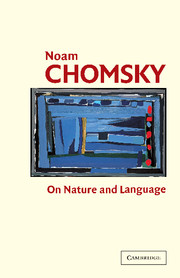4 - An interview on minimalism
Published online by Cambridge University Press: 05 September 2012
Summary
The roots of the Minimalist Program
ab&lr: To start from a personal note, let us take the Pisa Lectures as a point of departure. You have often characterized the approach that emerged from your Pisa seminars, twenty years ago, as a major change of direction in the history of our field. How would you characterize that shift today?
nc: Well, I don't think it was clear at once, but in retrospect there was a period, of maybe twenty years preceding that, in which there had been an attempt to come to terms with a kind of a paradox that emerged as soon as the first efforts were made to study the structure of language very seriously, with more or less rigorous rules, an effort to give a precise account for the infinite range of structures of language. The paradox was that in order to give an accurate descriptive account it seemed necessary to have a huge proliferation of rule systems of a great variety, different rules for different grammatical constructions. For instance, relative clauses look different from interrogative clauses and the VP in Hungarian is different from the NP and they are all different from English; so the system exploded in complexity. On the other hand, at the same time, for the first time really, an effort was made to deal with what has later come to be called the logical problem of language acquisition. Plainly, children acquiring this knowledge do not have that much data. In fact you can estimate the amount of data they have quite closely, and it's very limited;still, somehow children are reaching these states of knowledge which have apparently great complexity, and differentiation and diversity – and that can't be.
- Type
- Chapter
- Information
- On Nature and Language , pp. 92 - 161Publisher: Cambridge University PressPrint publication year: 2002
- 12
- Cited by



